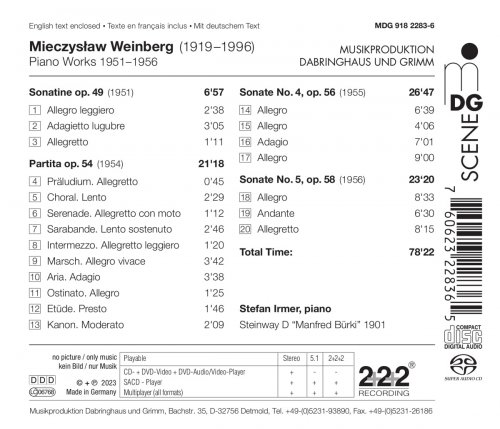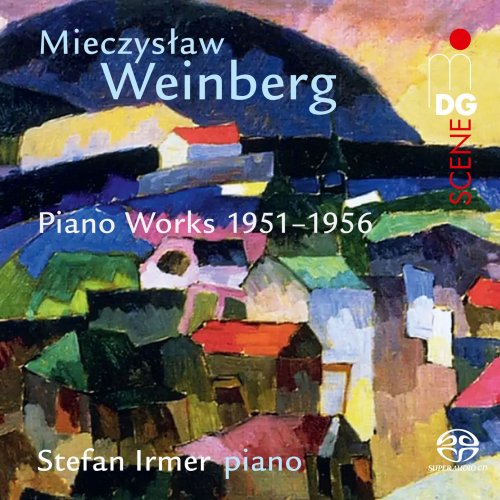
Stefan Irmer - Weinberg: Piano Works 1951 - 1956 (2023)
BAND/ARTIST: Stefan Irmer
- Title: Weinberg: Piano Works 1951 - 1956
- Year Of Release: 2023
- Label: Musikproduktion Dabringhaus und Grimm (MDG)
- Genre: Classical Piano
- Quality: flac lossless (tracks)
- Total Time: 01:18:20
- Total Size: 274 mb
- WebSite: Album Preview
Tracklist
01. Sonatine, Op. 49 (1951): I. Allegro leggiero
02. Sonatine, Op. 49 (1951): II. Adagietto lugubre
03. Sonatine, Op. 49 (1951): III. Allegretto
04. Partita, Op. 54 (1954): I. Prelude-Allegretto
05. Partita, Op. 54 (1954): II. Choral-Lento
06. Partita, Op. 54 (1954): III. Serenade-Allegretto con moto
07. Partita, Op. 54 (1954): IV. Sarabande-Lento sostenuto
08. Partita, Op. 54 (1954): V. Intermezzo-Allegretto leggiero
09. Partita, Op. 54 (1954): VI. March-Allegro vivace
10. Partita, Op. 54 (1954): VII. Aria-Adagio
11. Partita, Op. 54 (1954): VIII. Ostinato -Allegro
12. Partita, Op. 54 (1954): IX. Etude-Presto
13. Partita, Op. 54 (1954): X. Canon-Moderato
14. Sonata No. 4, Op. 56 (1955): I. Allegro
15. Sonata No. 4, Op. 56 (1955): II. Allegro
16. Sonata No. 4, Op. 56 (1955): III. Adagio
17. Sonata No. 4, Op. 56 (1955): IV. Allegro
18. Sonata No. 5, Op. 58 (1956): I. Allegro
19. Sonata No. 5, Op. 58 (1956): II. Andante
20. Sonata No. 5, Op. 58 (1956): III. Allegretto

Stefan Irmer goes in search of traces and presents Weinberg's demanding piano music as an intense, immediately touching experience. Mieczyslaw Weinberg's fate is exemplary for Jewish artists of his generation: the only one of his family to escape the Holocaust, he also faced anti-Semitic hostility in the Stalinist Soviet Union. No wonder that such existential experiences are reflected in his music, which to this day has been denied the recognition it deserves.
In the Partita op. 54: the most delicate sounds are suddenly juxtaposed with brute eruptions - a reflex to the imprisonment just survived during the last wave of Stalinist purges? The ten-part work challenges player, instrument and listener alike.
Weinberg's relationship to the Soviet Union was ambivalent: on the one hand, he owed his survival during the National Socialist era to the state, but on the other, this state also held its artists on a very short leash. More than almost any other composer, Weinberg succeeded in outwardly fulfilling the socialist guidelines while developing a very individual, personal style out of tonality and avant-garde, Jewish tradition and light muse.
A fine melancholy often pervades Weinberg's music, for example in the Sonata No. 4, which was premiered in its symphonic dimensions by Emil Gilels, or in the compelling Passacaglia of the 5th Sonata.
Under Stefan Irmer's hands on MDG's magnificent Steinway concert grand "Manfred B?rki", Weinberg's music emerges grandiose and new - a long overdue rehabilitation of a great composer!
01. Sonatine, Op. 49 (1951): I. Allegro leggiero
02. Sonatine, Op. 49 (1951): II. Adagietto lugubre
03. Sonatine, Op. 49 (1951): III. Allegretto
04. Partita, Op. 54 (1954): I. Prelude-Allegretto
05. Partita, Op. 54 (1954): II. Choral-Lento
06. Partita, Op. 54 (1954): III. Serenade-Allegretto con moto
07. Partita, Op. 54 (1954): IV. Sarabande-Lento sostenuto
08. Partita, Op. 54 (1954): V. Intermezzo-Allegretto leggiero
09. Partita, Op. 54 (1954): VI. March-Allegro vivace
10. Partita, Op. 54 (1954): VII. Aria-Adagio
11. Partita, Op. 54 (1954): VIII. Ostinato -Allegro
12. Partita, Op. 54 (1954): IX. Etude-Presto
13. Partita, Op. 54 (1954): X. Canon-Moderato
14. Sonata No. 4, Op. 56 (1955): I. Allegro
15. Sonata No. 4, Op. 56 (1955): II. Allegro
16. Sonata No. 4, Op. 56 (1955): III. Adagio
17. Sonata No. 4, Op. 56 (1955): IV. Allegro
18. Sonata No. 5, Op. 58 (1956): I. Allegro
19. Sonata No. 5, Op. 58 (1956): II. Andante
20. Sonata No. 5, Op. 58 (1956): III. Allegretto

Stefan Irmer goes in search of traces and presents Weinberg's demanding piano music as an intense, immediately touching experience. Mieczyslaw Weinberg's fate is exemplary for Jewish artists of his generation: the only one of his family to escape the Holocaust, he also faced anti-Semitic hostility in the Stalinist Soviet Union. No wonder that such existential experiences are reflected in his music, which to this day has been denied the recognition it deserves.
In the Partita op. 54: the most delicate sounds are suddenly juxtaposed with brute eruptions - a reflex to the imprisonment just survived during the last wave of Stalinist purges? The ten-part work challenges player, instrument and listener alike.
Weinberg's relationship to the Soviet Union was ambivalent: on the one hand, he owed his survival during the National Socialist era to the state, but on the other, this state also held its artists on a very short leash. More than almost any other composer, Weinberg succeeded in outwardly fulfilling the socialist guidelines while developing a very individual, personal style out of tonality and avant-garde, Jewish tradition and light muse.
A fine melancholy often pervades Weinberg's music, for example in the Sonata No. 4, which was premiered in its symphonic dimensions by Emil Gilels, or in the compelling Passacaglia of the 5th Sonata.
Under Stefan Irmer's hands on MDG's magnificent Steinway concert grand "Manfred B?rki", Weinberg's music emerges grandiose and new - a long overdue rehabilitation of a great composer!
Year 2023 | Classical | FLAC / APE
As a ISRA.CLOUD's PREMIUM member you will have the following benefits:
- Unlimited high speed downloads
- Download directly without waiting time
- Unlimited parallel downloads
- Support for download accelerators
- No advertising
- Resume broken downloads


